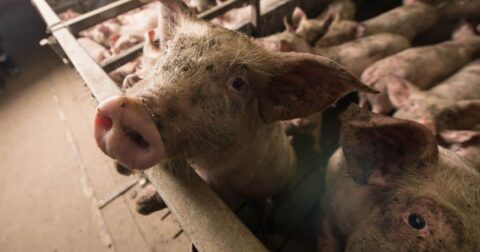News
SNAP Cuts in the Megabill, Explained
Policy•9 min read
Analysis
The new bill represents the single biggest challenge to animal welfare laws, but food safety and honey bee protections are also at risk.


Words by Marlena Williams
Earlier this summer, Senator Roger Marshall (R-KS) introduced the Ending Agriculture Trade Suppression, or EATS, Act into the Senate, followed two weeks later by a companion bill introduced in the House by Representative Ashely Hinson (R-IA). Despite its relatively innocuous-sounding acronym, the EATS Act represents the single biggest challenge to animal welfare legislation in years, and unlike similar bills that have come before Congress in the past, the EATS Act actually has a chance of passing.
As Sentient Media reported in June, the EATS Act is a sweeping and controversial piece of legislation designed to prevent state and local jurisdictions from regulating agricultural products within their borders. Under the Act, any law that places a pre-harvest “condition” on an agricultural product subject to interstate commerce could become illegal. The EATS Act is a direct response to the Supreme Court’s decision in May upholding Proposition 12, a California law that prohibits the in-state sale of certain pork products sourced from pigs held in extreme confinement.
The language of the EATS Act is as broad as it is vague. In short — any product from a farm could fall under the bill’s purview — leaving states virtually powerless to regulate not just animal welfare standards but plenty of other sweeping policy areas, like narcotics and food safety. The language of the bill also suggests that any product with an “agricultural element,” however minor, could be impacted, meaning laws regulating everything from plastic bags to medicines like insulin and heparin could be on the chopping block. What’s more, the bill contains an expanded citizen suit provision that would allow impacted individuals, businesses or trade associations to sue their state or local officials for injunction enforcement and even damages.
Many legal scholars think the EATS Act is unlikely to pass constitutional muster. The Act runs afoul of several key tenants of constitutional law, namely the 10th Amendment’s “anti-commandeering” doctrine, which reserves individuals states’ freedom to legislate to protect the health, safety and welfare of their citizens and bars Congress from directly commanding states to permit or prohibit something. In addition, the EATS Act could also violate the 11th Amendment’s provisions granting states immunity from suit in certain circumstances. In National Pork Producers Council v. Ross, the Supreme Court recently upheld the very kinds of laws the EATS Act aims to undermine.
But there is still reason to be concerned. The EATS Act currently has support from 11 Republican co-sponsoring Senators and 15 co-sponsoring Representatives. In early June, a coalition of 11 governors from major agricultural states wrote a joint letter to Congress urging it to pass legislation that would undermine Proposition 12 and legislation like it. The Chair of the House Agriculture Committee, Glenn “GT” Thompson, has voiced support for the EATS Act and signaled his willingness to include the Act in this year’s pivotal Farm Bill. Though similar legislation helmed by Representative Steve King (R-IA) has failed in the past, a potent combination of industry lobbying, reactionary Republican sentiment and slightly better optics (Steve King has been routinely criticized for his white supremacist views) could turbo-charge the EATS Act towards passage in 2023.
If that happens, over 1,000 state and local laws could be at risk. Here are 8 crucial laws under threat from the EATS Act:
1. Laws Banning Extreme Animal Confinement
The most obvious target of the EATS Act is Proposition 12, and the many other state laws that aim to improve the living conditions of pigs, egg-laying hens and veal calves held in extreme confinement. Though Proposition 12 is the most well-known, several other states have passed similar animal welfare legislation in recent years. Massachusetts currently bans the sale of products sourced from animals confined in a cruel manner, and Colorado forbids farmers from knowingly confining an egg-laying hen in an enclosure with less than one square foot of usable floor space. In July, New Jersey’s governor Phil Murphy also signed a bill into law banning the use of gestation crates. If the EATS Act passes, any state or local attempt to eliminate the cruelest aspects of the factory farm system could violate federal law.
2. Foie Gras Bans
In 2004, California passed a law that restricted the in-state production and sale of foie gras, a “delicacy” made by force-feeding geese and ducks through a metal or plastic tube. Though Californians can still purchase foie gras from out-of-state retailers, the law bans in-state retailers and restaurants from selling the product. In 2019, New York City also banned the sale of foie gras in the city, one of the largest markets for the dish nationwide. The EATS Act would ensure that such bans, which prioritize animal welfare over the excesses of fine dining, become obsolete.
3. Laws Designed to Prevent the Spread of Zoonotic Diseases and Infections
Almost all states have enacted laws to prevent the spread of diseases and infections by setting health certification requirements and regulating the importation, transportation and possession of certain live animals. These laws are designed to minimize the transfer and spread of a wide variety of zoonotic diseases, including avian influenza, swine flu, salmonella, tuberculosis, Newcastle disease, anthrax, scrapie, rabies, chronic wasting disease, equine infectious anemia and many others.
Iowa — home to Ashley Hinson and Chuck Grassley, two of the EATS Act’s main cosponsors — currently has comprehensive laws designed to prevent the growth and spread of zoonotic infections by mandating that no animal that is affected with or has been exposed to any infectious, contagious or communicable disease be shipped or transported into the state unless approved by a state veterinarian. Iowa also imposes strict pre-entry requirements on the importation of pigs and sets detailed sanitization requirements for all stock cars and trucks used to transport livestock into the state. The EATS Act could help undo many of the major regulations that protect Representatives Hinson and Grassley, as well as 3.1 million Iowans, from the spread of potentially deadly animal-borne diseases.
With the avian influenza outbreak continuing to ravage the food system and climate change threatening to make the spread of such zoonotic diseases even worse, the EATS Act would undermine these life-saving laws at the very moment when we need them the most.
4. Protections for Companion Animals
It isn’t entirely clear how the EATS Act would impact state and local laws that regulate the treatment and sale of companion animals like dogs and cats. But because the Act’s definition of “agricultural product” is so broad and ambiguous, encompassing “any and all products raised or produced on farms,” legal experts have serious questions about its outer limits.
Though not typically considered “agricultural products,” pets and exotic animals raised for commercial purposes could potentially be swept into the law’s seemingly limitless reach, according to a report from the Animal Law & Policy program at Harvard. States as varied as Colorado, Rhode Island, Washington, Utah and South Carolina all set strict requirements for the adoption, transfer and sale of most animals kept as pets.
Many states have laws making it illegal to sell or purchase a puppy or kitten that is less than eight weeks old. Massachusetts has a law prohibiting the devocalization of dogs and cats, and Wisconsin prohibits the sale of ducks, chickens and rabbits that have been artificially dyed. The EATS Act could pave the way for these important animal welfare protections to be overturned. Laws prohibiting commercial breeding operations could also come under attack, making New York’s recent Puppy Mill Pipeline Act vulnerable.
5. Imported Bee Laws
Bees are yet another example of livestock that could be impacted by the EATS Act. Honey bees are an essential part of our ecosystem — they play a key role in pollinating the dozens of cash crops that rely on them each season. Millions of captive bees are trucked across the country each year to pollinate at least 90 varieties of commercially grown crops. Because of how crucial bees are to our current agricultural system, nearly all states regulate apiaries and the interstate movement of bees, in part to prevent outbreaks of diseases and parasites like the American foulbrood that threaten the survival of this crucial species. But because such regulations potentially impose “pre-harvest” conditions under the current text of the EATS Act, they could potentially be in danger. Without state laws guaranteeing a safe and healthy bee population, it is no exaggeration to say that the entire economy and food system could be in grave danger.
6. Laws Protecting Crops from Invasive Pests and Diseases
Almost every state in the country regulates the importation of agricultural products to contain or prevent certain pests, diseases, bacteria and invasive species from ravaging its own plants and trees. States are currently allowed to regulate the treatment, inspection, certification and quarantine of most any agricultural product that enters their state. Without such laws, the crops, plants and trees within a state could suddenly be susceptible to a wide variety of pests, like boll weevils, the glassy-winged sharpshooter and the emerald ash borer as well as noxious weeds and bacteria that causes phony peach disease in fruit trees. These laws would also be at risk should the EATS Act pass.
7. Fishing Laws & Regulations
The EATS Act’s definition of “agricultural product” encompasses all fish and shellfish in the U.S., whether farm-raised or wild-caught. That means the Act could plausibly prevent any state commercial or recreational fishing regulation that impacts the preharvest production of fish and shellfish, from equipment restrictions to licensing requirements to mandates related to the source, species and size of a catch. States like West Virginia, Illinois, and Arkansas also have pre-entry permitting and certification requirements designed to prevent the spread of bacterial diseases like hemorrhagic septicemia, which can be transmitted by infected fish or through the water and can be lethal in livestock.
8. Horse Slaughter Laws
There is currently no federal law explicitly banning the slaughter of horses for meat. Federal funds cannot be used to inspect the slaughter of horses, making the interstate sale of horsemeat virtually impossible, but the intrastate sale of horse meat is still feasible thanks to the personal use and custom slaughter exemptions in the Federal Meat Inspection Act.
In California, it is a felony to possess, import or export a horse with the intent to kill that horse for human consumption. A similar bill recently passed in the New York state legislature. Texas, Illinois and New Jersey also ban the slaughter of horses for human consumption. The EATS Act could potentially force these states to allow for the importation of horses for personal consumption and prevent other states from enacting similar laws in the future.
Unfortunately, the EATS Act wouldn’t stop there. The Act could also impact regulations that touch on many medical and recreational drugs, and weaken laws around product labeling and licensing. Laws regulating hazardous wastes, particularly those produced by factory farms, could be vulnerable, as well as restrictions on the use of pesticides, fertilizers and antibiotics. The EATS Act could even make it illegal for cities and states to set procurement preferences for small, women-owned or minority-owned businesses.
It doesn’t take a legal scholar or a policy expert to see that the EATS Act is, at best, misguided and at worst, utterly destructive. Should it become law, it could change the way our food system operates in dozens of small and very large ways, making it even more difficult to pass the kinds of animal welfare legislation that more and more Americans are starting to demand.
This piece has been updated.